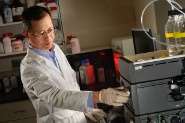Biological systems engineering scientist develops critical vaccines for human, pig diseases

Pig herds infected with porcine reproductive and respiratory syndrome can be financially devastating to farmers. The syndrome causes reproductive failure in sows and respiratory disfunction in young pigs.
Mike Zhang, a professor in the Department of Biological Systems Engineering, which is in both the College of Agriculture and Life Sciences and the College of Engineering, is researching how to develop a vaccine to combat this porcine pandemic that costs farmers as much as $560 million per year. The disease is one of the most economically devastating illnesses to the swine industry.
Current vaccines exist that are not as effective as using modified live viruses to stimulate an immune response from the pig, and using any iteration of live viruses would be too risky to use on industrial-sized food-animal populations.
"The challenge is to develop safe and effective vaccines," said Zhang.
Zhang is working to develop a recombinant universal vaccine that has similar strains to the live virus, but carries no threat of the animal contracting the disease. His research is now being conducted in the newly constructed 93,860-square-foot Human and Agricultural Biosciences Building 1. The increased lab space and state-of-the-art facilities will be good for productivity, he said.
He also works on developing vaccines for humans to breath easier as well, but in a vastly different endeavor that seeks to eliminate addiction to nicotine in tobacco products.
Zhang uses a nanocarrier system that can effectively present the nicotine haptens to the immune system. Haptens are small molecules that elicit an immune response when attached to a larger carrier such as a protein.
He is also using the same nanotechnology to fight cancer by using nanoparticles to deliver treatment to specifically targeted cells and tissues.
Zhang is funded in part by grants from the United States Department of Agriculture and the Institute for Critical Technology and Applied Science.
"All of my research is very different," said Zhang. "But it all has the potential to benefit society."
Provided by Virginia Tech


















